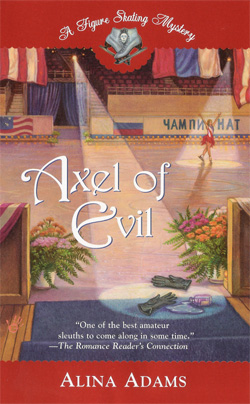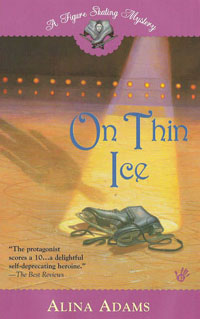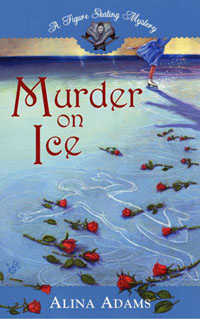SKATING TURNS PRO (PART #5)
So now that we know how professional competitions began, let's take a long, sad look at how they ended. (Well, technically, they're not really over-over, but the Golden Age of Pro Skating (TM) certainly is):
In 1994, Candid Productions, for the first time in a long while, found themselves encountering competition off, as well as on, the ice. Explains then-VP Jirina Ribbens, "After 1994, there was this huge boom of competitions, and a lot of other promoters got in the business."
1994 saw the addition of numerous professional championships, most of them created to fill a gap in CBS' programming schedule due to the loss of football.
The Rock 'N' Roll Championships encouraged skaters to get down and skate to more eclectic music than was allowed in eligible competition. Appropriately, teen-ager Oksana Baiul won the Ladies' event.
And thirty-six year old Scott Hamilton, the Men's.
The World Team Championship saw Kristi Yamaguchi, Paul Wylie, Urbanski & Marvel, and Wynne & Witherby as Team U.S.A., finishing in second behind Team Russia (Anna Kondrashova, Alexander Fadeev, Gordeeva & Grinkov, and Usova & Zhulin), and ahead of Team Europe (Katarina Witt, Robin Cousins, Glaser & Rauschenback, and Torvill & Dean) and Team Canada (Josee Chouinard, Kurt Browning, Brasseur & Eisler, McDonald & Smith).
All scores being cumulative, this format favored the best all-around team, rather than those built around one star.
The United States fielded the best woman in the sphere, Kristi Yamaguchi, but their pair team was, at best, third-ranked. Team Europe boasted the best dance team, Torvill & Dean, but a last place pair team, and two singles who, while artistically untouchable, were nowhere near the level of the other Ladies and Men technically. As a result, Russia, with the superior Pair team, Gordeeva & Grinkov, and the second best dance, Usova & Zhulin, was able to camouflage the weakness of their Singles to win it all.
1994's Ice Wars also featured a team format, with Team U.S.A. (Yamaguchi, Kerrigan, Boitano, and Wylie) easily besting the total strength of The World (Witt, Baiul, Browning, and Petrenko).
Unwilling to be left behind during the skating explosion, Dick Button also added a pair of events to his league. The Canadian Pro Championship debuted in December of 1994, followed by the U.S. Pro Championship in 1996.
A win at either U.S. Pros, Canadian Pros, or Challenge of Champions earned the victor an automatic invitation to the jewel in the crown, the World Pro.
Another 1994 Candid event, the Gold Championship, presented a field exclusively of Olympic Gold medalists -- and the upset of the decade. Scott Hamilton, with fleet footwork, superb presentation, and not a Triple Axel in sight, defeated the man some consider the best jumper ever, Brian Boitano. Before the competition, Scott was quoted as saying, "I can't beat Boitano in the air, so I'll have to beat him beat him on the ground." Which he promptly did.
The Gold Championship returned in 1995 and 1996, but, in 1997, the event was skipped due to Scott Hamilton's recovery from cancer.
Says Ribbens, "We dropped it, because Scott wouldn't have been able to compete, and there is no replacement for Scott."
By 1996, television producers were running low on novel ideas. They'd done team events, head to heads, Pro-Ams. So they tried The Great Skate Debate, with the competition's studio audience playing judge and voting on the winners (Yuka Sato won the Ladies', Hamilton the Men's) and Battle of the Sexes, teams of women (Yamaguchi, Sumners, Manley, and Kadavy) versus teams of men (Browning, Hamilton, Wylie, and Boitano).
It was hokey.
It was a gimmick.
It was the highest rated skating-event of the season.
Says ABC's Doug Wilson, "Skating is a marvelous, sweet pie. And when the popularity of it grew, a heck of a lot more people, driven by a buck, became interested. But, the pie didn't get bigger. The quality events didn't get any bigger. So the pie got bigger with created events. Created for not necessarily the good of skating, but for the profit of those who were putting them on. The problem of the burden on the skater to have many more routines, is a major consideration."
It was not, however, a consideration for long. As the ratings began falling, so did the number of professional, made-for-TV competitions. When Dick Button sold Candid Productions to SFX in 1999, the World Pros mutated into a more generic team competition. Then, in 2000, SFX itself was acquired by Clear Channel and more or less fell off the face of the Earth. (Again, I know it technically did not, but it sure feels that way; The World Pros used to be the highlight of the professional skating year. I miss it).
In 1994, Candid Productions, for the first time in a long while, found themselves encountering competition off, as well as on, the ice. Explains then-VP Jirina Ribbens, "After 1994, there was this huge boom of competitions, and a lot of other promoters got in the business."
1994 saw the addition of numerous professional championships, most of them created to fill a gap in CBS' programming schedule due to the loss of football.
The Rock 'N' Roll Championships encouraged skaters to get down and skate to more eclectic music than was allowed in eligible competition. Appropriately, teen-ager Oksana Baiul won the Ladies' event.
And thirty-six year old Scott Hamilton, the Men's.
The World Team Championship saw Kristi Yamaguchi, Paul Wylie, Urbanski & Marvel, and Wynne & Witherby as Team U.S.A., finishing in second behind Team Russia (Anna Kondrashova, Alexander Fadeev, Gordeeva & Grinkov, and Usova & Zhulin), and ahead of Team Europe (Katarina Witt, Robin Cousins, Glaser & Rauschenback, and Torvill & Dean) and Team Canada (Josee Chouinard, Kurt Browning, Brasseur & Eisler, McDonald & Smith).
All scores being cumulative, this format favored the best all-around team, rather than those built around one star.
The United States fielded the best woman in the sphere, Kristi Yamaguchi, but their pair team was, at best, third-ranked. Team Europe boasted the best dance team, Torvill & Dean, but a last place pair team, and two singles who, while artistically untouchable, were nowhere near the level of the other Ladies and Men technically. As a result, Russia, with the superior Pair team, Gordeeva & Grinkov, and the second best dance, Usova & Zhulin, was able to camouflage the weakness of their Singles to win it all.
1994's Ice Wars also featured a team format, with Team U.S.A. (Yamaguchi, Kerrigan, Boitano, and Wylie) easily besting the total strength of The World (Witt, Baiul, Browning, and Petrenko).
Unwilling to be left behind during the skating explosion, Dick Button also added a pair of events to his league. The Canadian Pro Championship debuted in December of 1994, followed by the U.S. Pro Championship in 1996.
A win at either U.S. Pros, Canadian Pros, or Challenge of Champions earned the victor an automatic invitation to the jewel in the crown, the World Pro.
Another 1994 Candid event, the Gold Championship, presented a field exclusively of Olympic Gold medalists -- and the upset of the decade. Scott Hamilton, with fleet footwork, superb presentation, and not a Triple Axel in sight, defeated the man some consider the best jumper ever, Brian Boitano. Before the competition, Scott was quoted as saying, "I can't beat Boitano in the air, so I'll have to beat him beat him on the ground." Which he promptly did.
The Gold Championship returned in 1995 and 1996, but, in 1997, the event was skipped due to Scott Hamilton's recovery from cancer.
Says Ribbens, "We dropped it, because Scott wouldn't have been able to compete, and there is no replacement for Scott."
By 1996, television producers were running low on novel ideas. They'd done team events, head to heads, Pro-Ams. So they tried The Great Skate Debate, with the competition's studio audience playing judge and voting on the winners (Yuka Sato won the Ladies', Hamilton the Men's) and Battle of the Sexes, teams of women (Yamaguchi, Sumners, Manley, and Kadavy) versus teams of men (Browning, Hamilton, Wylie, and Boitano).
It was hokey.
It was a gimmick.
It was the highest rated skating-event of the season.
Says ABC's Doug Wilson, "Skating is a marvelous, sweet pie. And when the popularity of it grew, a heck of a lot more people, driven by a buck, became interested. But, the pie didn't get bigger. The quality events didn't get any bigger. So the pie got bigger with created events. Created for not necessarily the good of skating, but for the profit of those who were putting them on. The problem of the burden on the skater to have many more routines, is a major consideration."
It was not, however, a consideration for long. As the ratings began falling, so did the number of professional, made-for-TV competitions. When Dick Button sold Candid Productions to SFX in 1999, the World Pros mutated into a more generic team competition. Then, in 2000, SFX itself was acquired by Clear Channel and more or less fell off the face of the Earth. (Again, I know it technically did not, but it sure feels that way; The World Pros used to be the highlight of the professional skating year. I miss it).






0 Comments:
Post a Comment
Links to this post:
Create a Link
<< Home